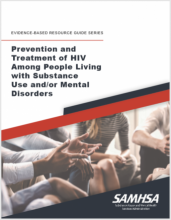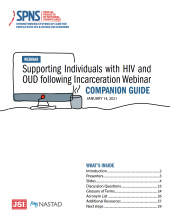
State health departments must dedicate staff and time to ensure a consistent approach to HIV and opioid use disorder (OUD) service delivery. For some states, this means creating new staff roles.



State health departments must dedicate staff and time to ensure a consistent approach to HIV and opioid use disorder (OUD) service delivery. For some states, this means creating new staff roles.
Data partnerships help coordinate HIV and opioid use disorder (OUD) services across state programs. These relationships can help state agencies identify service overlap and gaps, identify common goals, and initiate collaboration.
This resource describes how state health departments and other public health organizations can partner with people with HIV and/or who use(d) drugs in programmatic and policy making processes and evaluation.
Language is foundational to how we understand and interact with ourselves and others. Unclear language can lead to confusion and inefficiencies, while stigmatizing and prejudicial language leads to harmful practices and dehumanizes people.
This series of videos shines a light on the HIV testing experiences of four individuals. Each story is unique, but they all challenge the HIV provider community to reflect upon how to provide inclusive, empathic, culturally responsive, and stigma free HIV testing, treatment, and prevention.
This month, the Department of Health and Human Services (HHS), through the Substance Abuse and Mental Health Services Administration (SAMHSA), announced three funding opportunities to strengthen mental health and substance use systems and services for people with or affected by HIV:
Navigating the HIV and substance use systems of care presents a number of unique challenges, many of which can become more complex depending on a person’s housing, employment, mental health, or economic situation.
This guide offers considerations for how state agency staff can develop and maintain an accessible, HIV and opioid use disorder (OUD) service inventory. This guide can be used by state agency HIV and OUD staff to:
The growing opioid crisis across the United States has resulted in an increase in new HIV diagnoses.
Individuals who have HIV who also use drugs experience increased age-matched morbidity and mortality in comparison with those with HIV who do not use drugs.